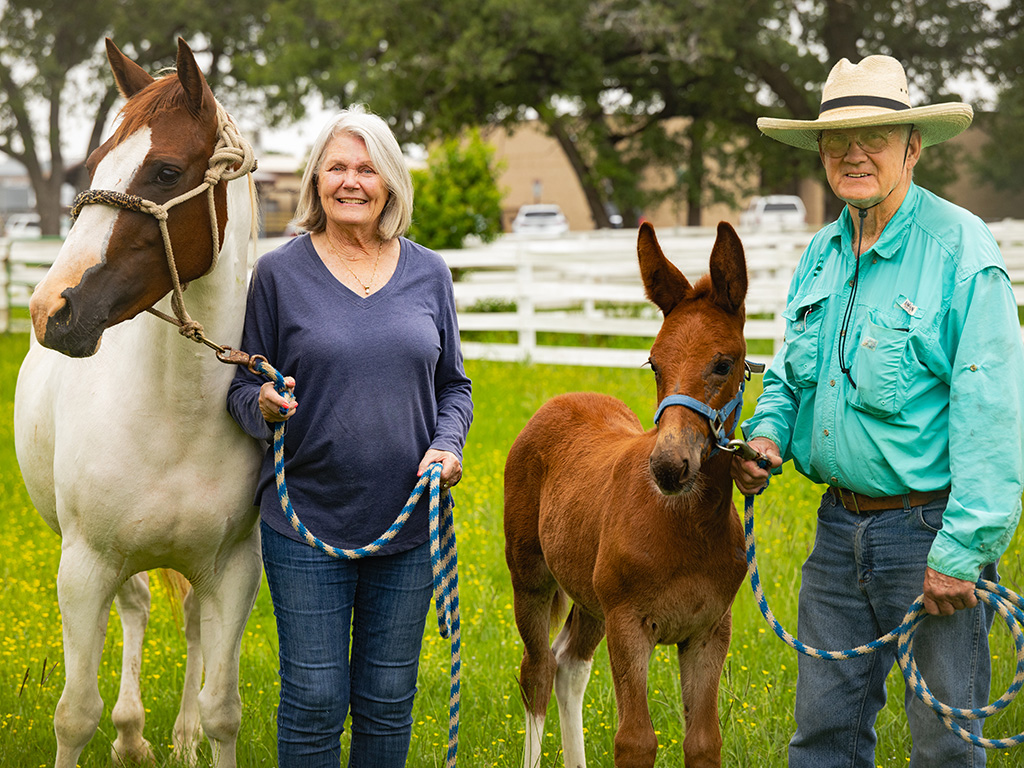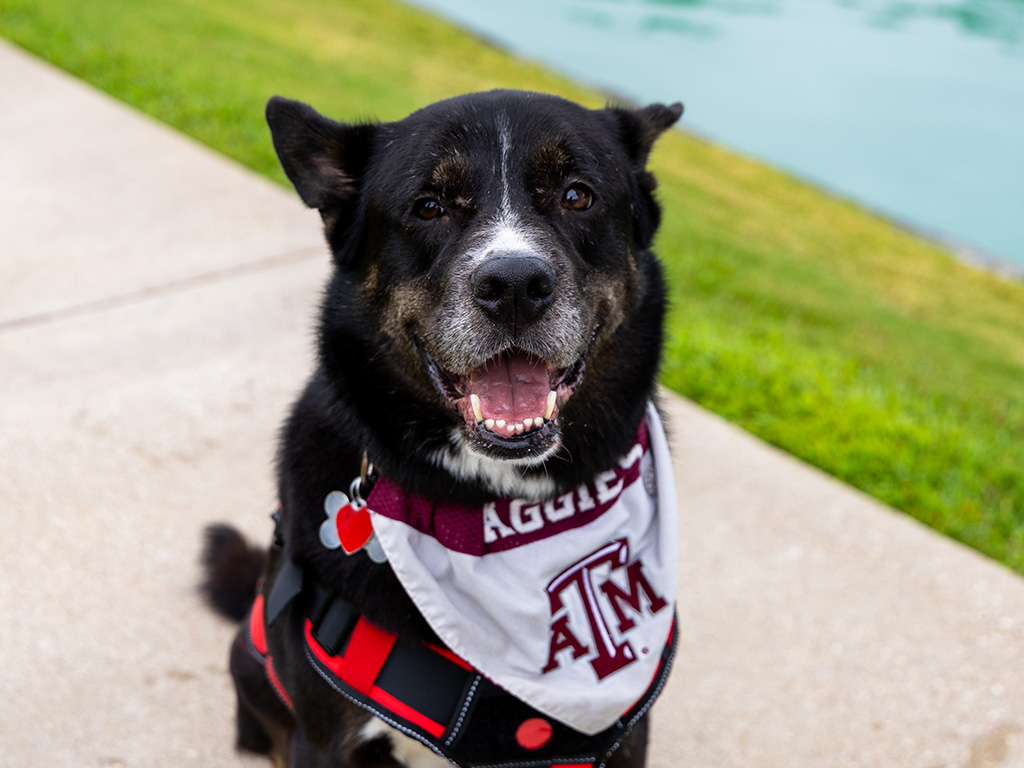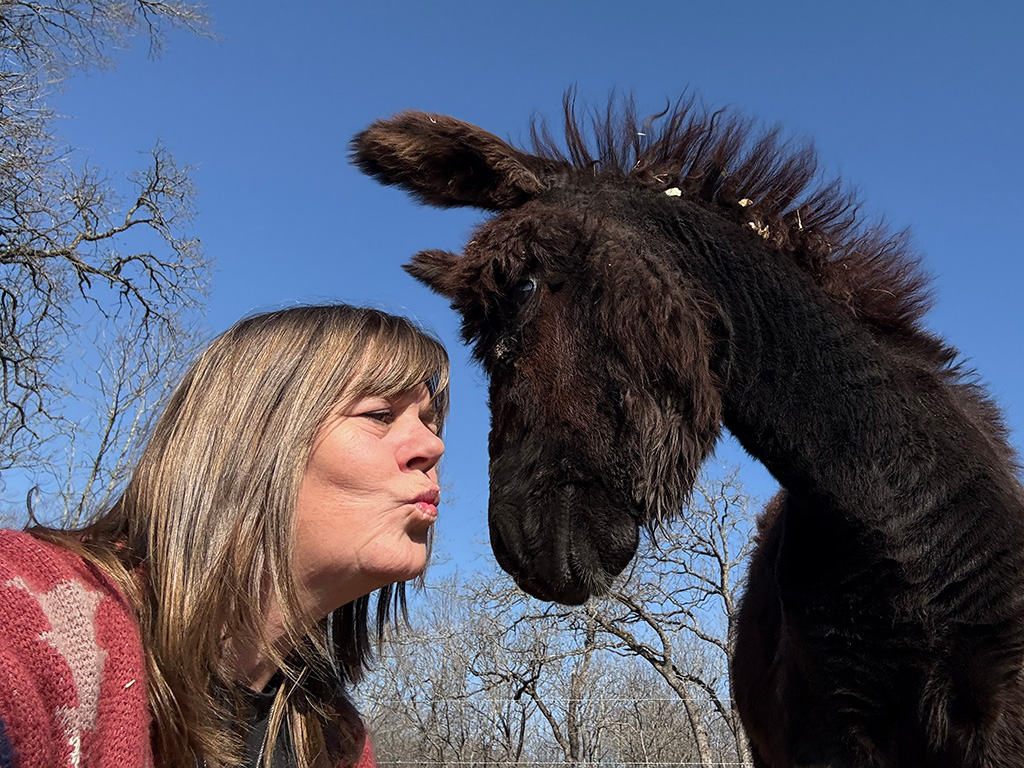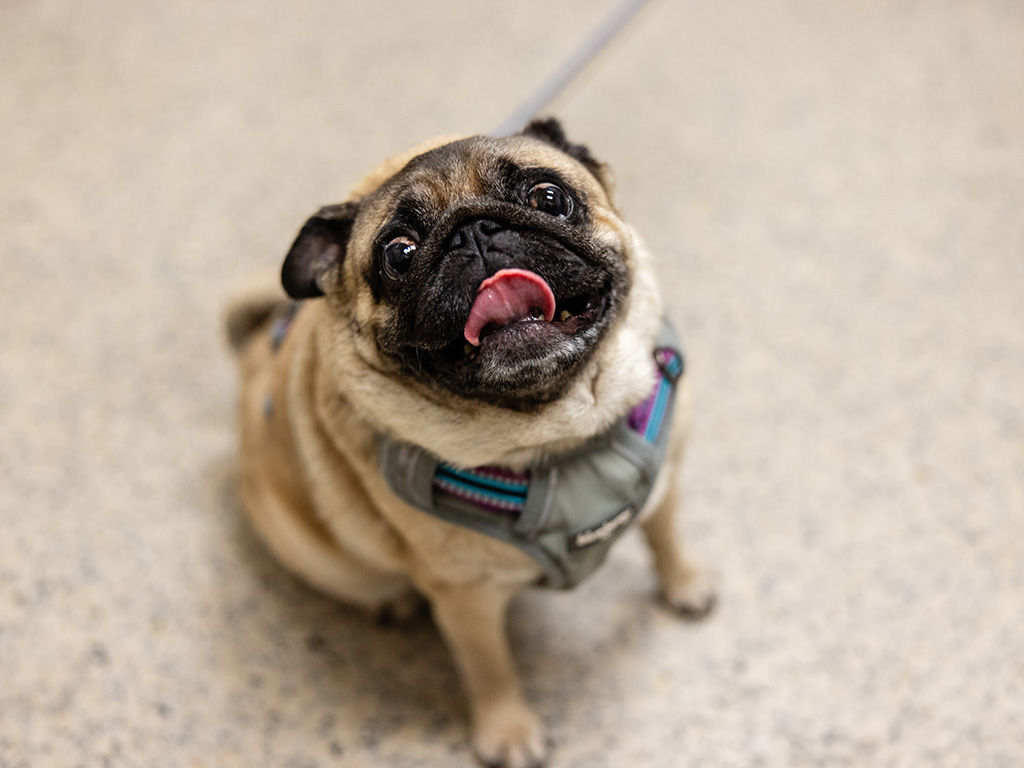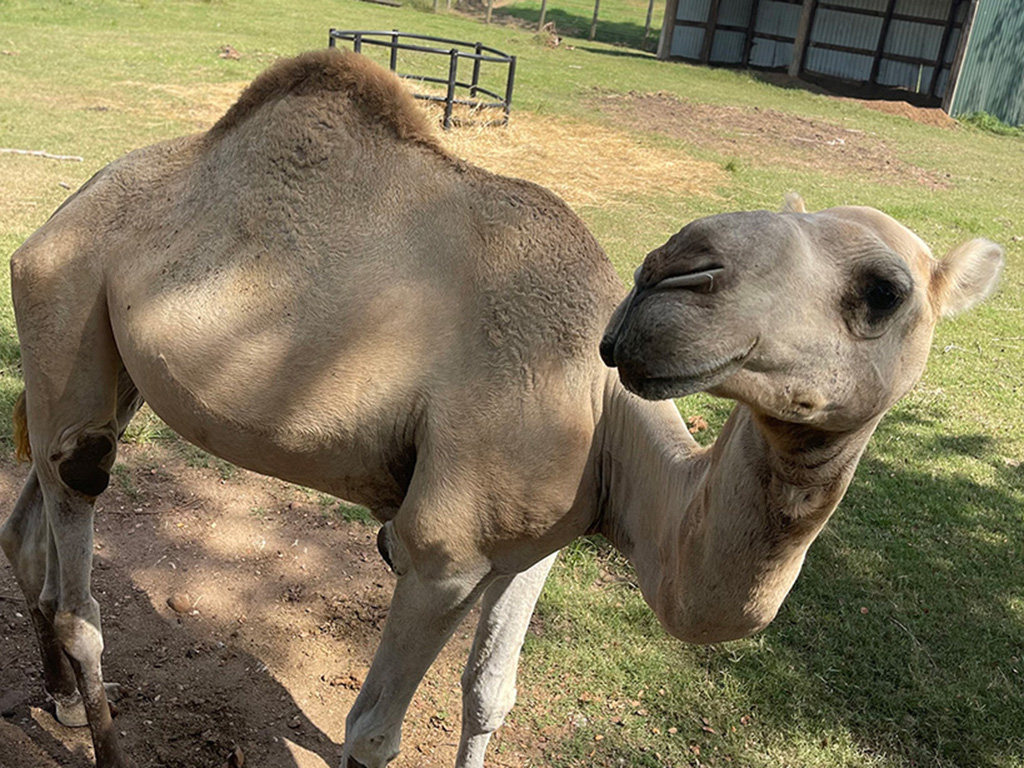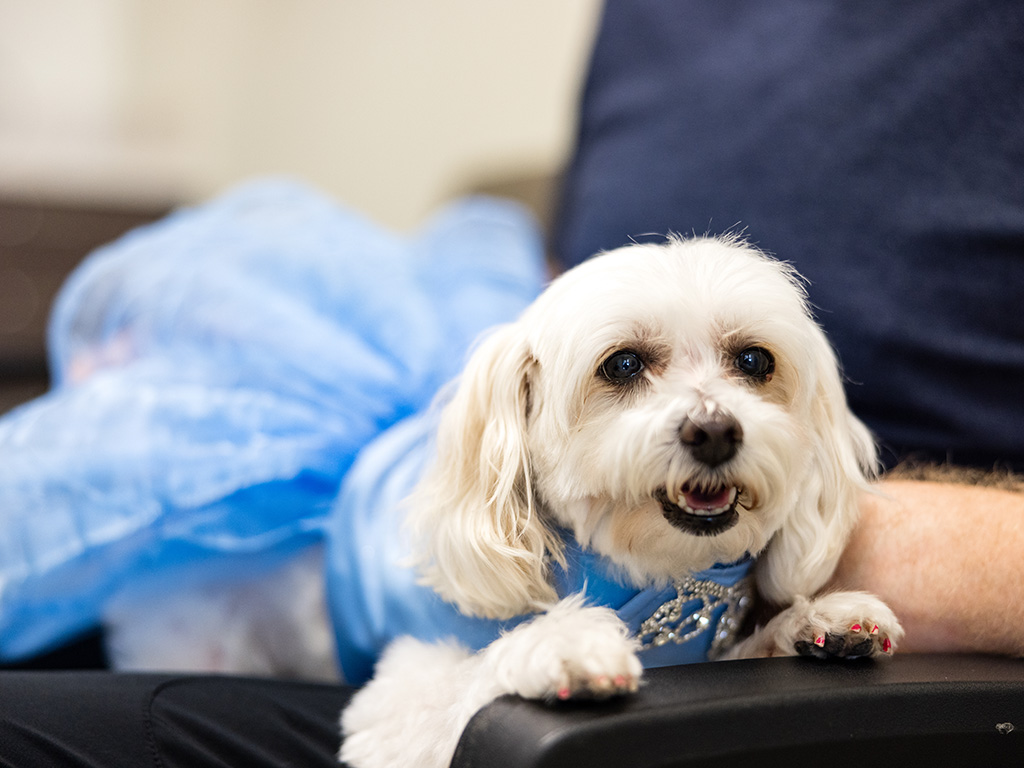From Feral To Fur-ever: Texas A&M Gives Cat Third Chance After Mammary Cancer Diagnosis
Story by By Michaela Dunn '26, VMBS Marketing & Communications

A chance encounter at a Houston loading dock in 2016 set the stage for an incredible journey of survival and transformation for Alice, a feral mother cat.
When Tobi Kosanke, a geologist from the Houston area, originally brought Alice home, the kitty was so scared of people that she hid from her rescuers for half a year. It was through Kosanke’s patience and dedication that the fearful feline eventually turned into a loving family pet who sought out attention.
This change proved vital for Alice, as her trust in her owners allowed them to discover a strange lump on her abdomen that turned out to be mammary cancer.
Thanks to her family, the dedicated efforts of the Texas A&M Small Animal Teaching Hospital’s (SATH) oncology team, and support from the Petco Love Fund, the 12-year-old cat is now back to enjoying life with her forever family.
From Feral To Fur-ever
Kosanke first met Alice after receiving a call about a feral mother cat and her kittens that were found on a loading dock for a company called ALS, a name that eventually inspired the cat’s name.
Alice was very elusive and wary of humans, but with the help of a kind dock worker, Kosanke managed to trap and take Alice home to her rescue, Crazy K Farm. Her two kittens were also rescued and sent to loving homes.
“Though our rescue typically focuses on farm animals, we couldn’t turn away from Alice’s plight,” Kosanke said. “She was so scared of people. We brought her home and set her up in a large cage in our living room, and it took months of gentle interaction before she began to trust us.”
Despite the gentle nature that Alice would eventually reveal, she was originally very jumpy and difficult to catch — or even see.
“She was always hiding under her cat bed. It was a year before she would come out and eat in front of us and even longer before we could touch her,” Kosanke said. “Alice’s transformation was remarkable. From a skittish feral cat, she became a loving and affectionate member of our family.”
Despite her small size, Alice ruled over the household’s other cats with confidence, and content with her new indoor life, she never attempted to go outside.
A Life-Saving Diagnosis
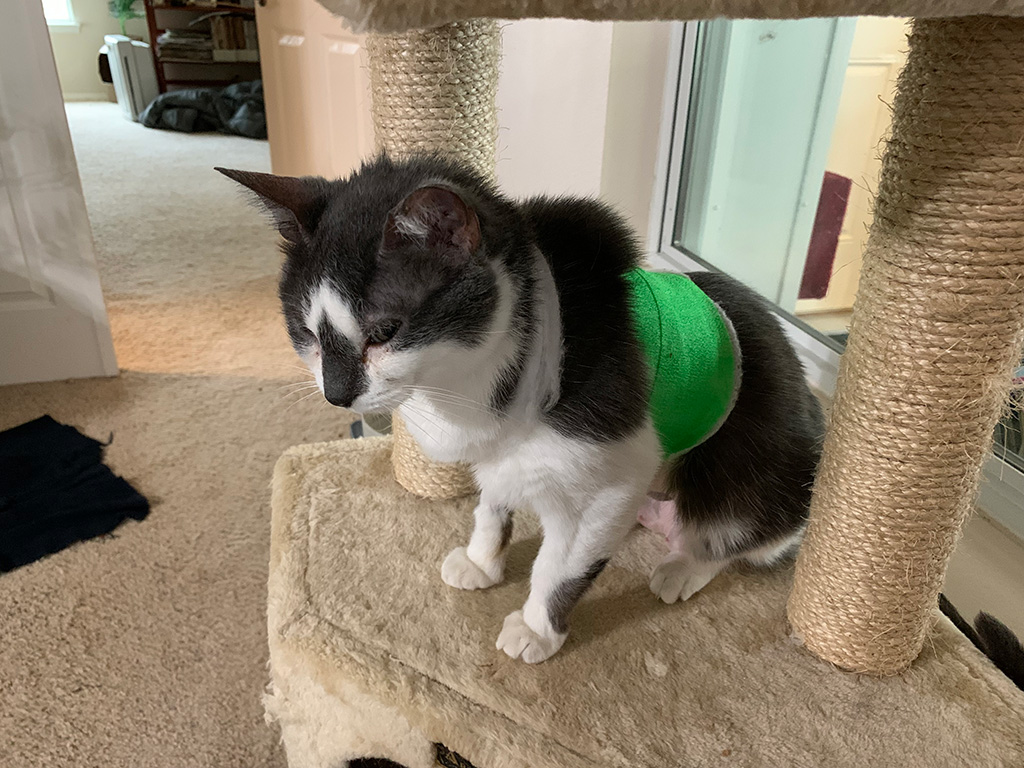
In December 2023, Kosanke was petting Alice when she discovered a lump on the cat’s abdomen, leading Kosanke to immediately schedule an appointment with her local veterinarian.
“They initially misdiagnosed her with a cyst and sent her home,” Kosanke said. “After three months, the bump had rapidly grown into a mass that felt similar to a lump of grapes.”
Knowing deep down that it was likely cancer, Kosanke took Alice to her local veterinarian again, only to be told there was nothing they could do to treat her. She was referred to a specialty animal hospital, where the mammary cancer diagnosis was confirmed.
“We were told Alice would need to undergo two surgeries to remove all the cancerous cells,” Kosanke said. “After receiving a hefty surgery estimate from that clinic, we sought a second opinion at Texas A&M.”
At the SATH’s Oncology Service, Alice’s care team was able to quickly assess the situation and provided a comprehensive treatment plan the next day.
“The biggest risk factor for mammary cancer is when the cat was spayed,” said Dr. Emma Warry, a clinical associate professor of oncology at the Texas A&M College of Veterinary Medicine & Biomedical Sciences. “Alice was found as a stray, so she had likely had several heat cycles beforehand, increasing the odds that she would develop this type of cancer.
“We knew that the tumor was aggressive, so its initial removal was likely not going to be enough. That’s why we recommended a procedure to remove all mammary tissue on both sides,” Warry said. “This surgery would increase the likelihood of a complete recovery.”
Prior to surgery, Alice underwent a thorough evaluation, including an abdominal ultrasound and chest radiographs, to ensure there was no metastasis; thankfully, the cancer hadn’t spread to other areas and she was cleared for surgery.
“A&M said Alice would only have to go through one procedure, which would greatly reduce the cost and her recovery time,” Kosanke said.
Also, thankfully, the surgery went smoothly, and throughout her treatment, the once-skittish Alice was the perfect patient.
“Alice is an absolute gem; she is so sweet and calm, which made it easy to take care of her before and after the procedure,” Warry said. “Alice was fortunate that the cancer had not spread and that we were able to treat her in time. Her owners were also very proactive, following all our recommendations and contributing to her successful recovery.”
The Gift Of Recovery
When Kosanke got ready to pay for Alice’s treatment, she was shocked to learn that the cost had been covered by the Petco Love Fund, which provides financial assistance for SATH oncology patients that meet certain criteria and have a good prognosis.
“Because we’re a rescue, we only have so many funds for each animal,” Kosanke said. “I wasn’t sure I could afford any of her medical bills, but I was willing to get some credit cards and figure it out.”
This unexpected support allowed Kosanke to focus on Alice’s recovery without any financial stress.
“Not only did A&M save her life, but they also actually saved the life of my rescue because the funds that went to Alice would have kept me from being able to provide medical care to other animals,” Kosanke said.
“Alice was a perfect candidate for the fund,” Warry said. “Her owners are wonderful and dedicated, and Alice is a lovely cat. She met all the criteria for the Petco Love Fund, which allowed us to provide the treatment she needed.”
Since her surgery, Alice has been closely monitored with regular check-ups, including chest X-rays and abdominal ultrasounds. So far, there has been no sign of recurrence and Alice is thriving, continuing to enjoy a full and happy life with her family.
“We’re incredibly grateful to Texas A&M and the Petco Love Fund for their support,” Kosanke said. “Alice is more than just a pet — she’s a cherished member of our family. The care she received was exceptional, and we’re so happy to see her healthy and full of life again.”
###
For more information about the Texas A&M College of Veterinary Medicine & Biomedical Sciences, please visit our website at vetmed.tamu.edu or join us on Facebook, Instagram, and Twitter.
Contact Information: Jennifer Gauntt, Director of VMBS Communications, Texas A&M College of Veterinary Medicine & Biomedical Sciences, jgauntt@cvm.tamu.edu, 979-862-4216
You May Also Like

